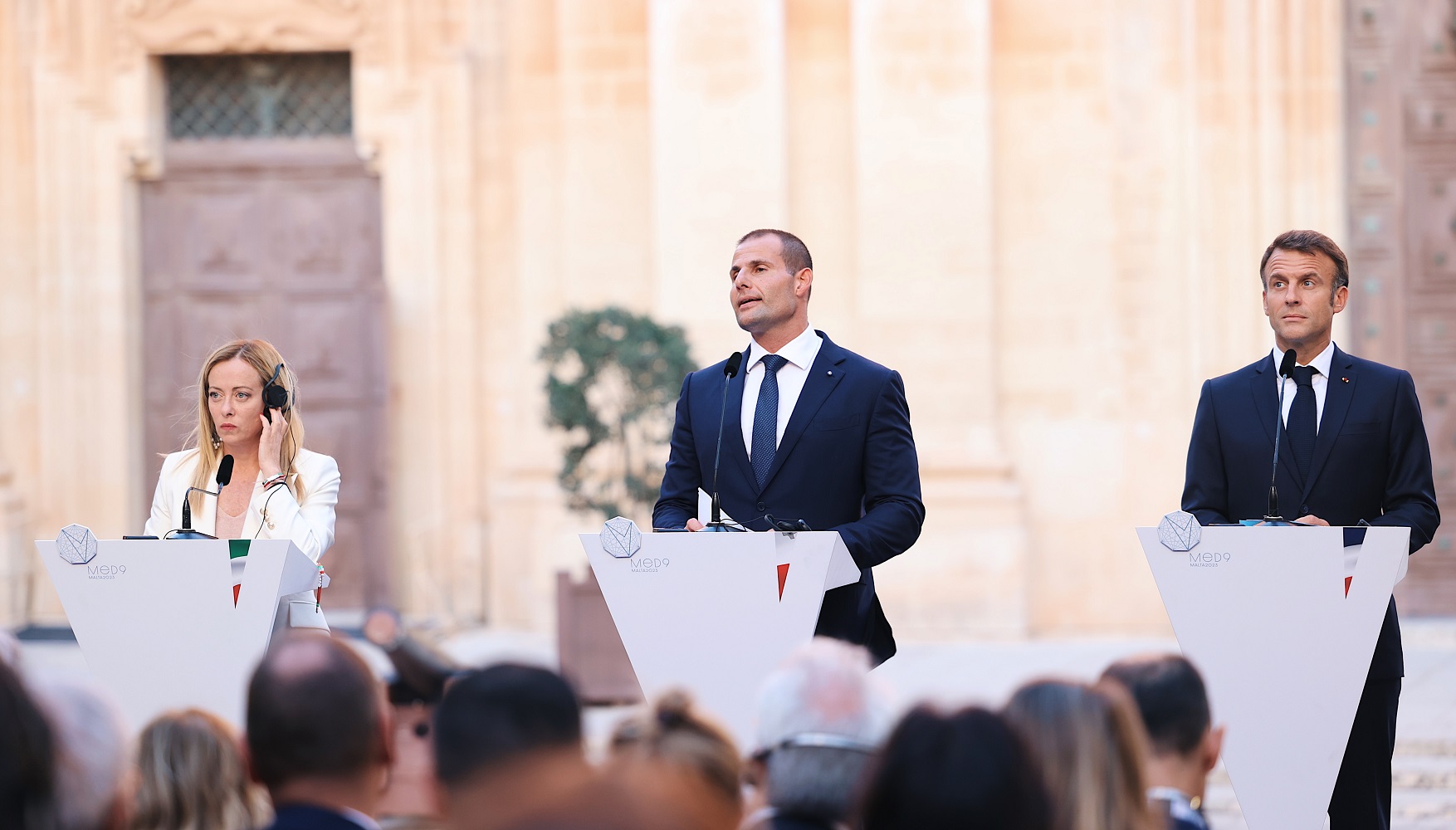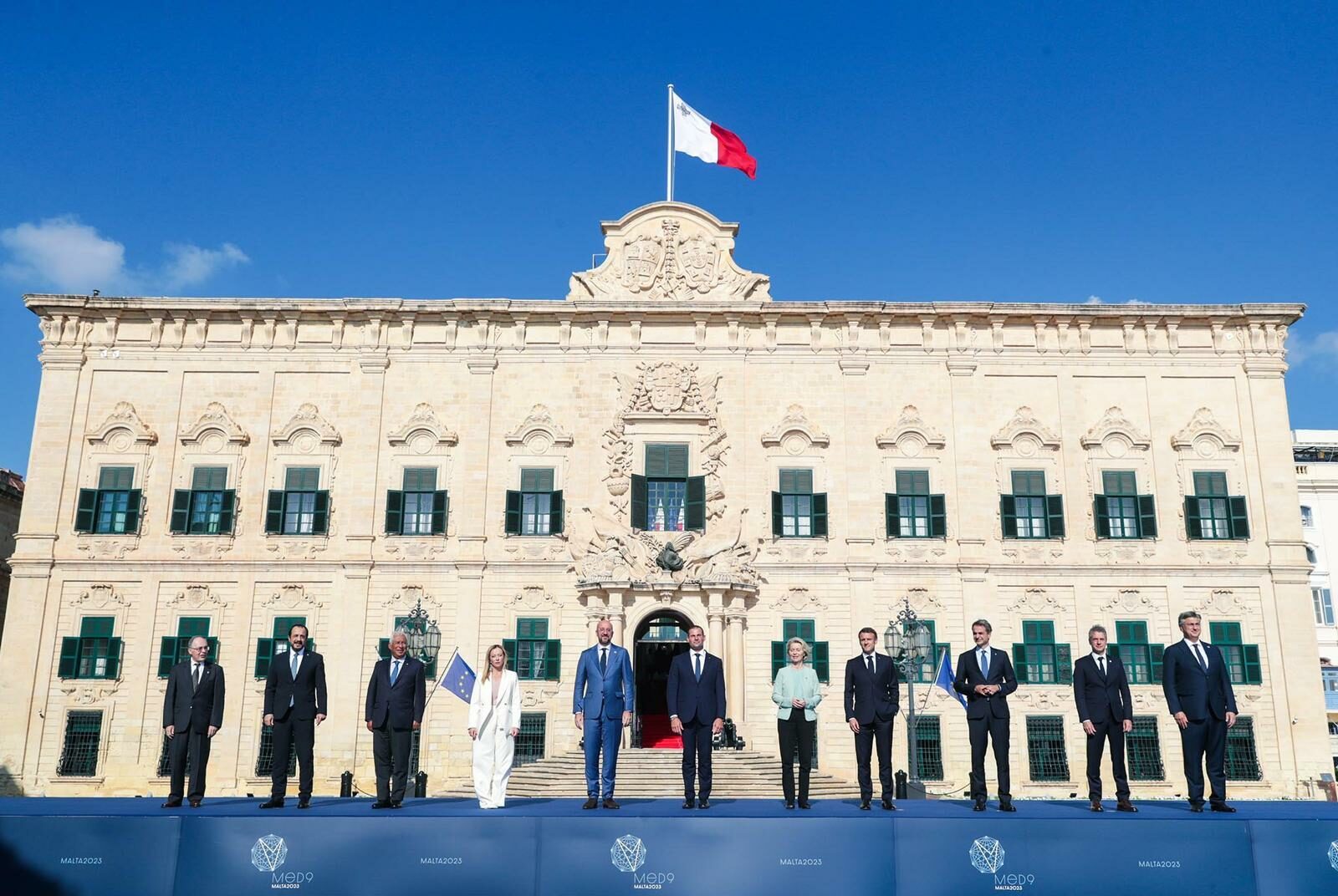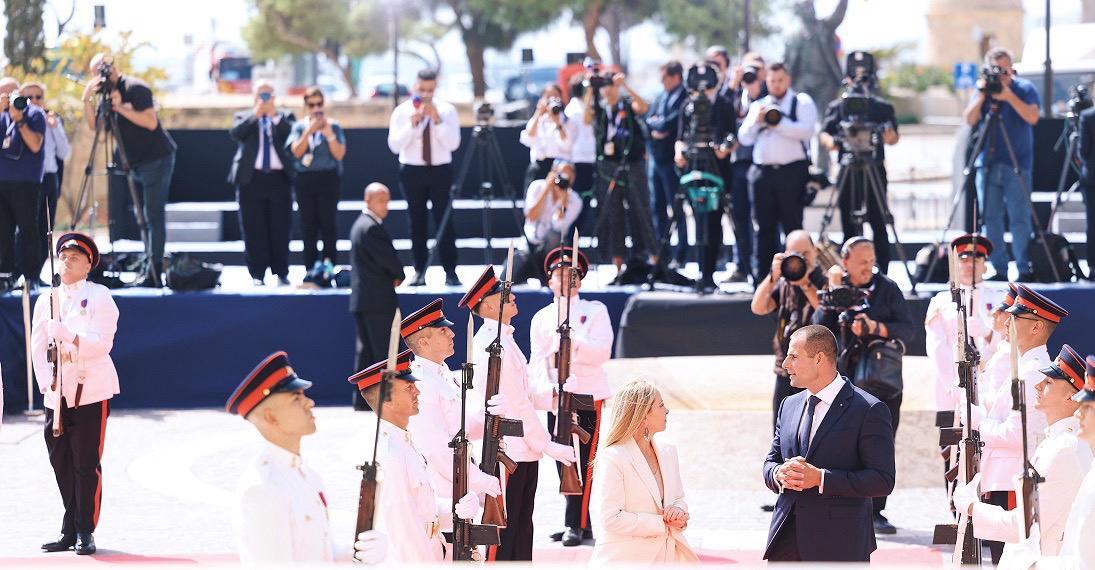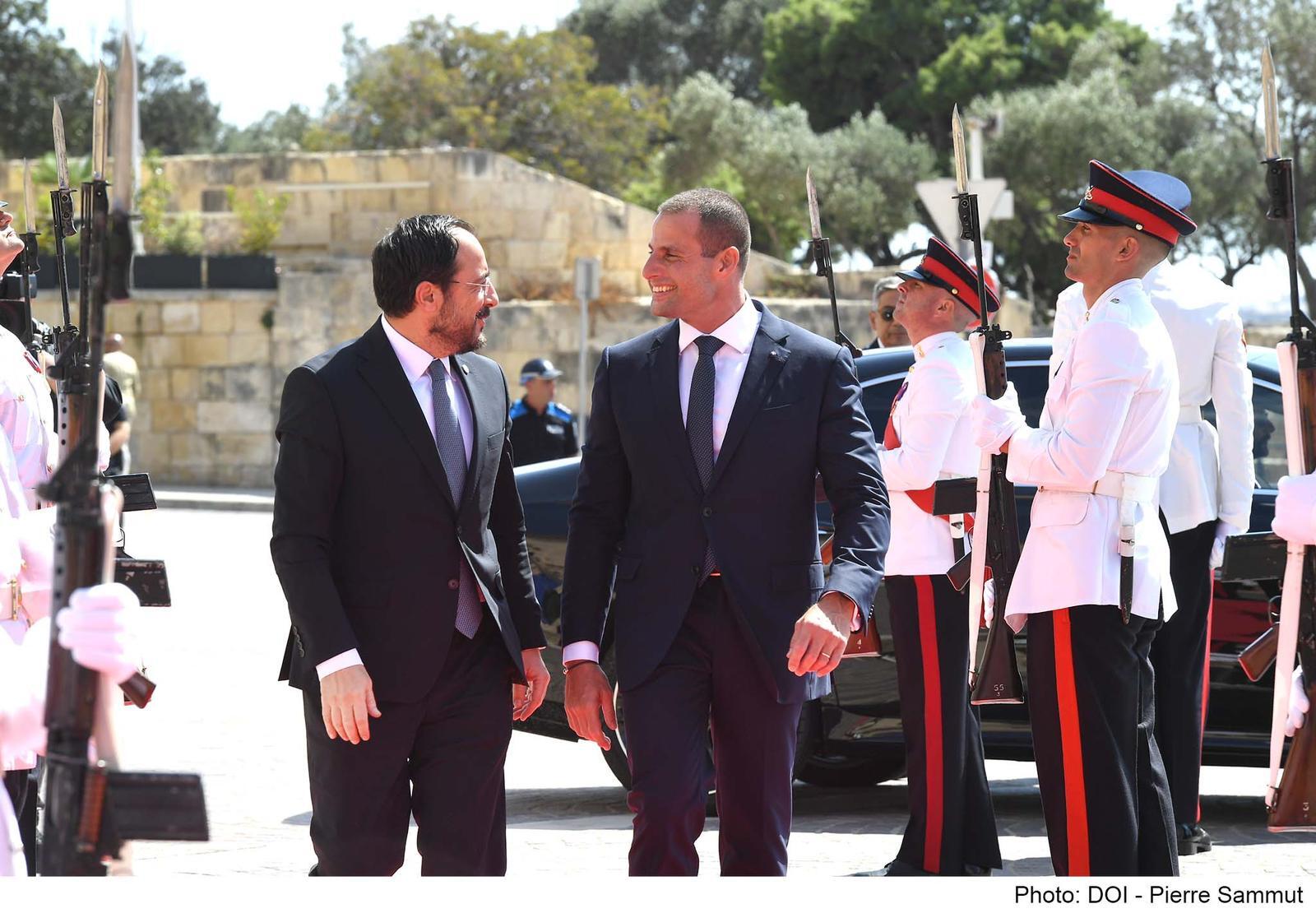
Your excellencies,
Dear friends,
It has been an honour to welcome my fellow colleagues to Valletta for our 10th Summit. I want to thank everyone who has taken part in our discussions. We have come together to plot a practical plan for the future of our region. Last week at the United Nations I spoke about how with the right decisions we can get the future right. I am convinced that by working together we can challenge the insecurity too many of our citizens feel and build a new age of security.
To get those decisions right, it is essential we coordinate and co-operate beyond national borders. The most immediate need is, naturally, to work with our neighbours. To face together the very specific challenges arising from our place in the world. In short that is what this MED9 group is about. Neighbours. Looking out for each other. Stronger. Working together to solve our common problems. Now like any neighbours we may not always agree about everything. But there is a lot more that unites us than divides us. It is to make just such a difference that whilst hosting the MED9 group, Malta embraced the opportunity to deepen our work.
For the first time not only have heads of state and government come together. But we have also brought together from across the MED9 Ministers with immediate responsibility in the areas where we face the most urgent issues. Their job has been to dig into the detail and develop plans for immediate action. And their conclusions have been vital in framing today’s declaration. As nine nations, in many ways we couldn’t be more different. Different languages, different stories, different heritage. But we are all united by the shimmering beauty of the Mediterranean Sea. And I’m sure you’ll forgive me for regarding Malta as the ‘Jewel in the Crown’.
We also saw the power of the Mediterranean story this summer when creative talent from our nations came together to share their work in the first ever Mediterranean Film Festival. The films are just like our countries; different but sharing common experiences. All our countries are bonded by our outward looking, maritime traditions. By the knowledge that we can best face the future by seizing those opportunities together. Solutions that benefit the whole of Europe, that bring benefits for every member state. Because every member state knows that there cannot be a stable, peaceful, and prosperous Europe without a stable, peaceful, and prosperous Mediterranean. Events which unfold in the Mediterranean do not just stop at our borders. All the EU is impacted by what goes on in the Mediterranean.
As the MED9 nations we believe that EU-Southern Mediterranean relations need a reset. We will continue to work together to ensure that our southern neighbourhood remains high on the Union’s agenda. To advocate for that relationship to go beyond aid. And instead help empower our southern neighbours to invest in skills so they can tap into the tech revolution and develop their own economies to their full potential. This must be a tailored approach. Clearly irregular migration flows from the southern Mediterranean impact the whole of Europe. Tackling these flows is a priority for governments across our continent.
As the MED9 we recognise the need for a sustained and holistic European response. So, we urgently reiterate the call on the co-legislators to step-up negotiations on the Pact on Migration and Asylum to reach agreement before the end of the current legislative term. The pact must ensure that the needs of frontline states will be met. The rate of return of failed asylum seekers has to be improved. It is vital that smuggling networks are dismantled. But ultimately the issue needs to be tackled at source. To help achieve that, we underline the need to urgently build more robust, comprehensive partnerships with all our partners in the southern Mediterranean. Therefore, we welcome the package of immediate assistance for Tunisia announced last week by the Commission. This has to be delivered. I must also thank Prime Minister Meloni and President von der Leyen for their important role in bringing about that agreement.
Over recent months we have seen just how exposed the Mediterranean region is to the impact of climate change and the devastating consequences of natural disasters. We send our deepest condolences to the peoples of Libya and Morocco. As good neighbours we will continue to offer support to their recovery and rebuilding efforts. But also, within our own countries, climate change has been taking its toll. There couldn’t be a stronger reminder that there must be no let up in efforts to combat both the causes and effects of climate change. We need to look again at how we adapt to climate change and how the Union addresses civil protection and crisis management. Of course, no nation is immune from either climate change or natural disasters. But it is clear the countries of Southern Europe are particularly vulnerable. And it is also clear that the Union’ current polices, and budget are simply insufficient to cope with a period of such natural disruption. Therefore, I welcome the efforts spearheaded by Prime Minister Mitsotakis to reform the way the EU responds.
Yes, as Mediterranean nations we are at particular risk from rising temperatures. But we are also able to make a particularly positive contribution to ensuring Europe’s energy independence, and delivering a clean, decarbonised energy future. Which is why I am especially proud that earlier this year our nine nations signed the Malta Statement. It was not some grand statement of intent, but a real roadmap to building a Mediterranean Green Energy Hub. Helping our neighbours to both decarbonise and increase their energy supply as their economies expand. Helping to harness the huge potential of solar from our North African neighbours tapping into the power of sharing energy. Ensuring the whole Mediterranean benefits from security of supply.
Colleagues,
Climate and the technological revolution are the most fundamental changes our societies face. At times the pace of that change can seem overwhelming. Citizens can feel a sense of loss of control. That’s why I am determined that we can and must ‘get the future right’. So, I was determined that as part of convening the MED9, Malta would bring the Mediterranean’s digital ministers together to look at the coming Artificial Intelligence revolution. To seize what Commission President von der Leyen has so acutely described as the “narrow window of opportunity to guide this technology responsibly.”
Malta is already leading the way with the use of AI in transforming the delivery of public services. And as the MED9 we have also committed to sharing best practice, using AI to combat cybercrime, utilising it to better respond to civil emergencies. We can’t stop the AI revolution. We can take the necessary action to harness this revolution for the good of all our citizens. If our citizens are to feel a new age of security, it is imperative that we work to equip all with the skills for developing digital economy. This is central to building an economy that works for working people. Where working people share in the fruits of growth.
The single market has been pivotal in fuelling the European economy. In this, its thirtieth year, today we reaffirmed our commitment to push for its full completion. We must ensure a level playing field, where no member state, and no region is left behind. What started three decades ago as a single market for goods and services must in its fourth decade become a true single market in ideas and information. Key to achieving that level playing field is connectivity. As Mediterranean nations we know just how important the maritime and aviation sectors are to our economies. So, we call for the barriers that hinder mobility in our region to be removed. Because we have a duty to make sure that the single market fully meets the needs of citizens.
One of those most fundamental needs is for citizens across Europe to have access to the medicines they need, at a fair price. This is of particular concern to us here in Malta. We cannot expect citizens to feel secure if they are worrying about the supply and price of the medicines they and their families rely on. If Europe fails this test, it fails the most fundamental test of all. So today we again call for a Critical Medicines Act and for work to progress on the Commission’s Pharmaceutical Reform Package. Only then will we be able to ensure sufficient production and availability of the most critical medicines and medical devices across the EU. Our message is loud and clear – there is no time to be lost in delivering the secure medicine supply chains our citizens are rightly demanding.
To conclude,
As the saying goes, the future is coming. Like any change that can be a scary prospect. But the answer isn’t to turn the clock back. Nor to throw up our hands in a vain attempt to try and hold off change. The answer must be to take the decisions that can ensure that we get the future right. I’m confident the decisions we have taken here today do just that. I look forward to seeing just how much progress we have made when we gather next in Cyprus in 2024.
Thank you.





Recent Comments